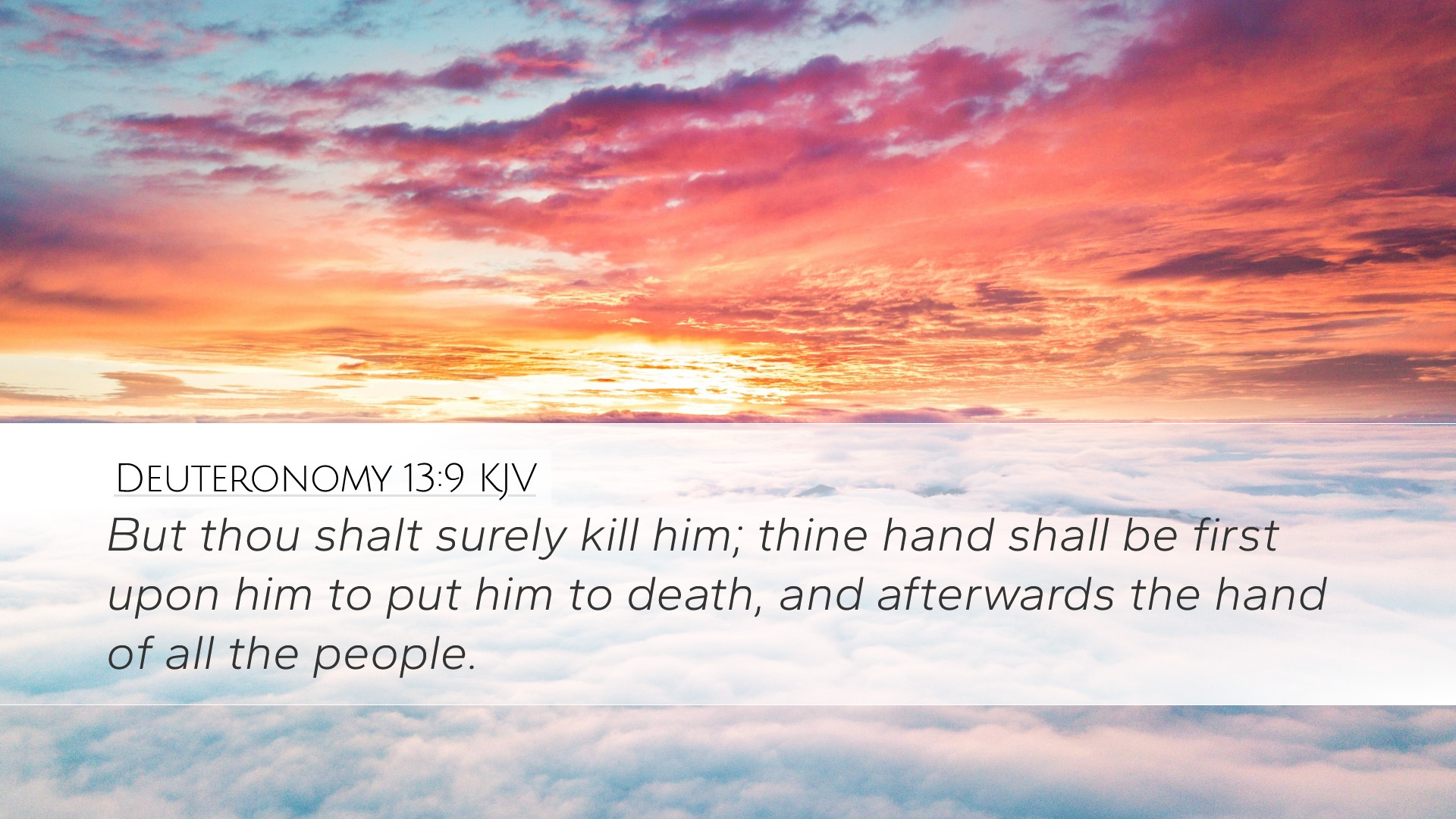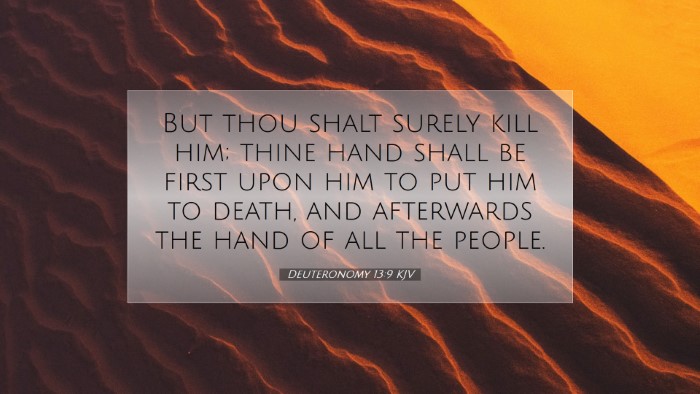Commentary on Deuteronomy 13:9
Verse Reference: Deuteronomy 13:9 - "But you shall surely kill him; your hand shall be first against him to put him to death, and afterward the hand of all the people."
Introduction
The verse in Deuteronomy 13:9 is a part of Moses' admonition to the Israelites regarding the severe sin of idolatry and the importance of maintaining fidelity to the one true God. This command serves both a legal and a moral framework for the community, aiming to prevent corrupting influences from spreading within the nation. The insights from various public domain commentaries shed light on the gravity of the situation and the rigorous measures prescribed in the text.
Moral and Legal Imperatives
Matthew Henry's Commentary emphasizes the serious nature of idolatry and how it undermines the foundational relationship between God and His people. Idolatry is portrayed not merely as a personal failing but as a communal threat that warrants a collective response. Henry notes that the swift and severe actions commanded in this verse are indicative of God's jealousy for His name and glory.
Albert Barnes expounds on the implications of the phrase "your hand shall be first against him." This highlights a principle of justice where the one who is aware of the transgression is also responsible for initiating its remedy. In a covenant community, believers are called to hold one another accountable, and leaders particularly are charged with upholding the standards set by God. He describes how public denunciation of heresy needs to be met with public action to preserve communal integrity.
Understanding Judicial Capital Punishment
Adam Clarke provides historical context, asserting that the judicial execution of an idolater was to serve as a deterrence to the community and to uphold the holiness of God's law. Clarke explains that this extreme measure reflects the seriousness with which God sees the act of turning away from Him. It is a call for holistic obedience among God's people, reminding them that their collective identity is tied to their covenant fidelity.
The Community’s Role
The instruction for the accuser to be the first in execution indicates a deep communal involvement in matters of faith and morality. The community aspect is vital in understanding this legislation. Each member is tasked with the responsibility to uphold God's standards actively.
Consequences of Idolatry
As per Henry, to tolerate idolatry is to invite God's judgment upon the people as a whole. Festivals, sacrifices, and communal worship are all intended to focus the people's hearts toward God, and idolatry disrupts this essential relationship. Therefore, removing idolaters is not simply a punitive measure but a form of divine protection for the rest of the Israelites.
Theological Reflections
This harsh command also opens up theological discussions regarding the nature of justice and mercy in God's dealings with humanity. Barnes remarks that understanding God's justice requires recognizing that divine holiness does not coexist with rebellion against His laws. Thus, this passage resonates deeply in light of the New Testament's revelations regarding sin and judgment – it reveals the seriousness with which God regards fidelity to His covenant.
Practical Applications
The implications of Deuteronomy 13:9 continue to resonate within the church today. Pastors and theologians can draw upon this text to discuss the necessity of church discipline, the importance of safeguarding doctrinal purity, and the responsibility that individuals have toward each other in a faith community.
- Community Accountability: Members of the church are encouraged to maintain a culture of accountability, recognizing that unchecked sin can lead to broader ramifications.
- Defending the Faith: This passage can also relate to the call for believers to be diligent in defending the truth of the Gospel against heretical teachings.
- Understanding Judgment: The seriousness of consequences as outlined in the Old Testament adds depth to the understanding of God's holiness and the nature of sin, and this informs how ministers preach the Gospel today.
Conclusion
Deuteronomy 13:9 provides a solemn reminder of the gravity of turning from God and the collective responsibilities that belong to a community of faith. By integrating insights from the commentaries of Henry, Barnes, and Clarke, we are better equipped to handle both the historical context and the modern application of God's Word. This verse challenges believers to take seriously their commitments to God and one another, ensuring that the body of Christ remains pure and devoted to its Head.


